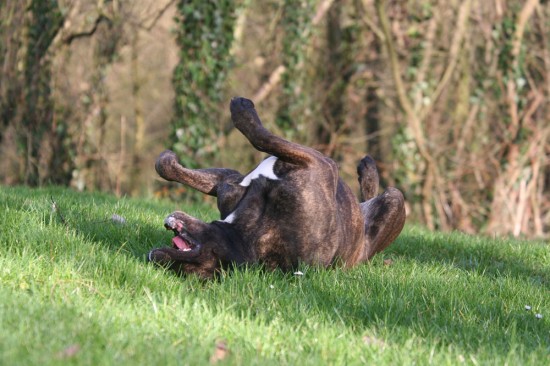It is extremely important for a dog owner to be informed of the dangers of the bloodsucking heartworm. As their moniker suggests, Heartworms live inside a dogs heart where they are able to do a lot of
damage. Conscientious dog owners must be attentive to the threat of heart worm infestations and take
suitable defensive actions. If you sense your dog has become infected you need to get urgent medical treatment from your veterinarian.
Heartworms or "Dirofilaria Immitis" in Latin, by and large live in the right ventricle of the heart where they are able to float without restraint around the hearts blood vessels. The Heartworm parasite is passed along by mosquitoes through their saliva. The saliva can transmit the bloodsucker to your
dog by means of a single bite. So even if your dog does not come into contact with other dogs it is at risk. It is a little recognized detail that cats are also vulnerable to the parasite.
There are generally four stages to an infestation by Heartworms. Your vet would be able to prescribe existing treatments based on what phase infestation your dog has.
In the initial or early stage infection your dog is not likely to demonstrate any symptoms. Even with a blood test it is not likely that the parasite will show its ugly head. It is a great deal easier and better for you
and your dog to prevent the heartworm infestation in first place. If you can keep your dog clean it will be much easier on you and him or her, as when they get to 6 to 7 months in age, treatments can have an unfavorable effect.
In the next phase of infestation the heartworms will begin to mature and manage their way to the heart muscle. At this point the worm infestation will start to be able to be picked up on x-ray. At this stage the worms will start to do their dirty work and you might observe your dog will become short of breath or begin to acquire a wheeze. This is due to injury being done to the blood vessels around your dogs heart and lungs. The larger the number of worms the quicker the damage will mount. It is not likely that your dog will only be infected with one worm. The worms tend to multiply quite quickly.
In the third stage of infestation you may possibly notice your dog start to quickly lose weight. Again, the heavier the infestation the more swiftly blood flow will be choked off. Testing at this moment may reveal kidney and liver destruction. You may witness fainting spells in your dog at this stage. Other|Additional|Further} symptoms would be shortness of breath, sluggish behavior and in severe cases a possible heart attack.
As if a stage three infestation is not bad enough the fourth stage is not where you want this kind of infestation to evolve to. In the fourth and most severe stage your dog will experience what is identified as Vena Cava Syndrome. At this point your dog will be in a near state of shock and will be close to death. The only alternative at this stage is surgery to eliminate the worms. Even with this radical measure
success is not guranteed.
In summary, the best thing you are able to do for your dog is to prevent Heartworms from even having a chance at your dog. If you get them on a good routine early on, it is likely that you may never have to deal with this dreadful problem.

 Introducing Your New Cat To Your Dog
Introducing Your
Introducing Your New Cat To Your Dog
Introducing Your
 Top Tips On Guinea Pig Skincare
Top Tips On Guine
Top Tips On Guinea Pig Skincare
Top Tips On Guine
 What should you consider before buying rabbit hutches?
What should you consider before buying rabbit hutches?
What should you consider before buying rabbit hutches?
What should you consider before buying rabbit hutches?
 The Modern World Of Horse Buying
The Modern World
The Modern World Of Horse Buying
The Modern World
 The Secret Language Behind Five Common Dog Behaviours
The Secret Langua
The Secret Language Behind Five Common Dog Behaviours
The Secret Langua